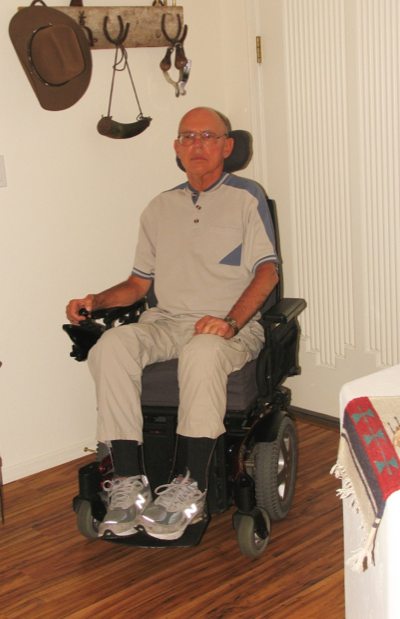 by Don Nemke, Oro Valley, Arizona
by Don Nemke, Oro Valley, Arizona
My name is Don Nemke and I’m 72 years old. I’ve had symptoms of FSH Muscular Dystrophy starting 60 years ago and was formally diagnosed about 54 years ago. I’m currently in an advanced stage of FSH and recently fully wheelchair-bound.
As an older patient with FSHD muscular dystrophy I have decades of experience with adapting to an ever-changing body and the loss of function caused by FSHD. I’m excited to share with you what I’ve learned through many years of observations and research.
Those of us with muscular dystrophy are very fortunate to be facing our challenges now rather than in the past. In just the last several years, there have been significant scientific breakthroughs regarding the underlying biological processes causing many forms of muscular dystrophy, including FSHD. These discoveries provide hope for many of us that potential cures are likely to be appearing on the horizon in the not too distant future. In addition, the accelerating pace of technological innovation helps us to live more independent and self-sufficient lives.
Muscular Dystrophy has been a major factor in my life for many years and I have had the opportunity to experiment with many aspects of trying to maintain or maximize the quality of life within the context of a constantly deteriorating physical condition. For me, trying to deal with the challenges involved can be divided into four interlocking principles.
- MAXIMIZE SAFETY: This is the most important. It means always conducting activities in the least risky manner possible. This includes the use of special equipment, modifications to living environment, adjusting physical movements and procedures and not pushing beyond the body’s capabilities.
- ACHIEVE THE GREATEST FUNCTIONALITY POSSIBLE: This means always trying to find solutions to physical shortcomings that will achieve the best possible result with reasonable effort expended and at acceptable costs.
- MAINTAIN INDEPENDENCE: This helps both physically and psychologically. Pushing for physical independence helps provide the mental toughness to aggressively pursue principles I and 2. Maximizing independence also helps relieve our family members and caregivers and enables them to pursue more of their own life activities. However, it is also critically important to recognize when outside help is needed, thus keeping highest priority on principles 1 and 2.
- GAIN AS MUCH KNOWLEDGE AS POSSIBLE: This one is critical to successfully deal with the prior three principles. There are two distinct components:
- INSIDE KNOWLEDGE: This means knowing yourself thoroughly, especially the very specific aspects of your physical challenges including rates of deterioration in each affected body part. Although we may be getting assistance from experts, they are unlikely to be able to come up with a best fit solution for us unless we share our unique conditions with them.
- OUTSIDE KNOWLEDGE: In order to find the best and most economical solutions for our physical issues, we need to first know what the options are, how they work, and what the costs are. New products are constantly being developed or improved, often with numerous variations in features and costs. We need to be primarily responsible for knowing what is available by reading appropriate technical literature, such as Quest Magazine, and especially using online data sources. A major side benefit to online product research is that it almost always results in finding prices more favorable than local dealers.
Having a solid base of both inside and outside knowledge not only enables us to be more effective and efficient in finding helpful tools and solutions for the physical difficulties, but also provides a basis for developing our own fixes or helpful support where generic solutions are inadequate or where solutions for our specific needs don’t yet exist. When you have done your homework you are better able to know what questions to ask and what answers are helpful.
I have shared a lifetime’s worth of tips and insights in my guide, where I discuss my experiences in home construction and renovation, home furnishings, supportive equipment, mobility equipment and travel.
Download Don’s full guide: Dealing with Physical Decline from Muscular Dystrophy.


Thanks for these tips for sharing your experiences and lhopefully a treatment in the very near future. Continue with your positive look in life and all the best to you
I am gravity chair-bed bound- must be lifted to walk a few steps and held to walk a stand up a moved in bed etc-excruciating pain shoulders and back/ no meds help except canines
Sleep 2hrs every night for yr. with sleep Rex from Physicians -tune fed-hungry Constant incontenence for yrs 86 years-so much medical.
Need quality of life??? Suggestions needed
Doris EMBRY-live w daughter etc Houston TX am from Philadelphia-any suggestions-read watch news a few other item???
–
THANKS FOR THE KIND WORDS AND ENCOURAGEMENT FOR THE FUTURE
Great insight! Thanks for sharing it. It was great meeting you all yesterday.
THANKS. SINCE YOU’RE IN THIS AREA IF YOU WANT TO SEE ANY OF THE HOME IMPROVEMENTS OR EQUIPMENT JUS CALL ME.
To Embry Doris. Have you tried CBD oil for the pain?